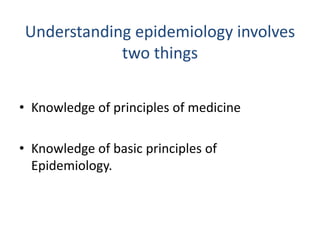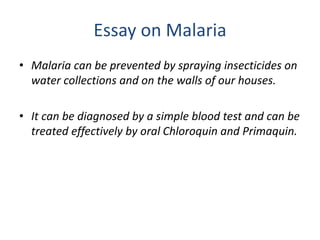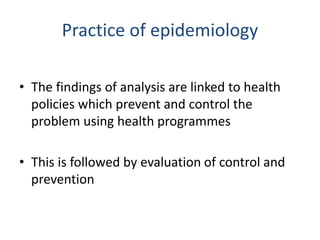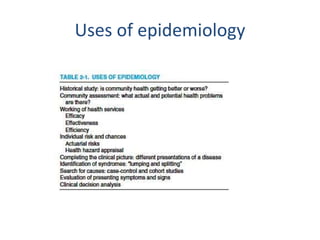Introduction to Epidemiology
- 1. Epidemiology “I keep six honest men; they taught me all I know. Their names are what, why, when, how, where, who.” Dr Naveen Phuyal MBBS, MD
- 2. Objectives of this class • Describe the concept of epidemiology • Historical development of epidemiology • Practice and use of epidemiology in health management and patient care.
- 3. Type of class • Interactive class • You can ask questions in between or at the end • Assignments
- 6. What is Epidemiology? I hate definitions. - Benjamin Disraeli (British Prime Minister)
- 7. What is epidemiology? • The study of how the disease is distributed in Populations. • The factors that determine or influence this distribution. • Why does a disease develop in some people and not in others?
- 8. Understanding Epidemiology • Illness and ill health are not randomly distributed in human populations. • Each of us have certain characteristics that predispose us to, or protect us against, a variety of different diseases.
- 9. Understanding Epidemiology • Epidemiology is the basic science of Public Health and Preventive Medicine. • Epidemiology is a scientific foundation for the practice of public health. • Epi- upon, demos- people
- 10. Understanding epidemiology • Epidemiology is a very special field. • Every standard medical text books have paragraph in Epidemiology • Epidemiology is a pervasive science and a basic tool for understanding and practice of all specialties of medicine.
- 11. Understanding epidemiology involves two things • Knowledge of principles of medicine • Knowledge of basic principles of Epidemiology.
- 12. Essay on Malaria • Malaria is caused by a parasite called Plasmodium. • It is transmitted by bite of female anopheles mosquito. It manifests as acute febrile illness with chills and rigors. • In our country 2-3 in 10000 people are likely to get malaria every year. • It is more common among children, poor people, foreigners, immunocompromised people. • It is common in Terai region, urban slums but not in hilly areas.
- 13. Essay on Malaria • Malaria can be prevented by spraying insecticides on water collections and on the walls of our houses. • It can be diagnosed by a simple blood test and can be treated effectively by oral Chloroquin and Primaquin.
- 14. The above facets put together is called as “Epidemiology”
- 15. • Epidemiology is that branch of medicine which answers the issues related to human health problems and diseases the magnitude that they pose, their distribution acc. to time place and person, and various factors which determines the causation, risk, prognosis, management and prevention of diseases.
- 16. Definitions • A branch of medical science which treats epidemics ( Parkin, 1873) • The science of mass phenomena of infectious diseases ( Frost, 1927) • The study of disease, any disease, as a mass phenomenon ( Greenwood, 1934) • The study of distribution and determinants of disease frequency in man ( Macmohan, 1960)
- 17. Epidemiology • “The study of the distribution and determinants of health-related states or events in specified populations, and the application of this study to the control of health problems.” --- John. M Last ( 1988)
- 18. • Although there is no single definitions, three components are common: • Study of disease frequency • Study of disease distribution • Study of disease determinants
- 19. Historical development of Epidemiology
- 21. History • 400 BC Hippocrates: Occurrence of human diseases to the environment “ On Airs, Waters and Places”
- 22. Assignment
- 23. History • Control of communicable disease and public health through quarrantine and isolation, ideas about disease transmission and microbiology. • Johann Peter Frank systematized and codified many rules for personal and communal behavior in the eighteenth century.
- 24. Assignment • Willam Farr in 19th Century • John Snow: 1850
- 25. Assignment
- 26. Assignment • Case control study on smoking and lung Cancer by Sir Richard Doll and Sir AB Hill
- 27. What does the brief history about epidemiology teach us? • Community and environment influence of health of humans • Knowing how a disease is transmitted permits us to prevent and control it even if we do not know the cause.
- 28. What does the brief history about epidemiology teach us? • Simplest information about vital events, illness and populations can detect and analyze epidemiological problems. • Epidemiology can help find, investigate, analyze, control, and prevent a wide range of health problems.
- 29. Practice and use of epidemiology in health management and patient care.
- 30. Practice of epidemiology • The basic operation of epidemiologist is to count cases and measure the population in which they arise. • The practice of epidemiology is a scientific process that detects, investigates and analyzes health problems followed by applying this information to the control and prevention of these problem.
- 31. Practice of epidemiology • The findings of analysis are linked to health policies which prevent and control the problem using health programmes • This is followed by evaluation of control and prevention
- 33. Objectives of this class • Describe the concept of Epidemiology • Historical development of Epidemiology • Practice and use of epidemiology in health management and patient care.
- 34. Thank You


































